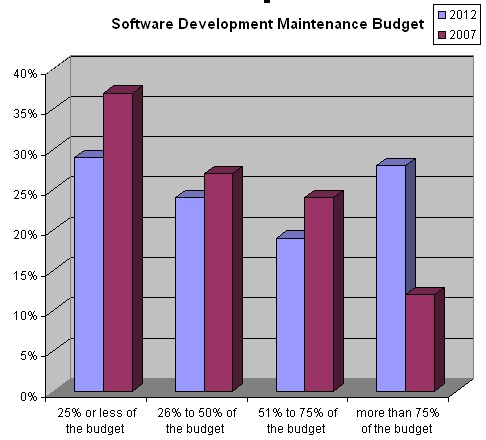Open source development tools like MySQL, Eclipse, PHP or JBoss are now adopted by many software development organizations. Our last poll examined how the quality of open source tools is perceived against their commercial competitors. We conducted a similar poll twice in the past and it is interesting to compare the results.
| Open source versus commercial tools | 2008 | 2006 | 2004 |
| Same quality | 31% | 38% | 32% |
| There is no easy answer to this question | 25% | 22% | 24% |
| Superior in quality | 21% | 20% | 26% |
| Inferior in quality | 12% | 12% | 13% |
| I do not use open source tools | 6% | 6% | 4% |
| I do not use commercial tools | 3% | 2% | 1% |
| Participants | 913 | 524 | 312 |
Source: Methods & Tools
We can see that the results have not changed significantly compared to the previous polls. Even if the number of participants thinking that quality is similar has decreased slightly, a majority still judges that open source software development tools is as good or better than commercial products.
Open source is now mostly an industrial activity
The difficulty to answer can be explained by the increase of the diversity of management type for open source projects. We have seen a noticeable growth of the industrialization of major projects. This has been realized by different means: acquisition of open source companies (MySQL by Sun), industrially backed foundations (Eclipse, Apache) or funding by venture capital (SpringSource, Zend). Commercial involvement has also been noticeable in providing support to open source with hosted communities or forges (codeplex.com, code.google.com). Initiatives like the Google summer of code (code.google.com/soc/) provide also new resources to open source projects.
Money is certainly not a guarantee for higher quality, but it allows open source projects to have better development conditions. They can also do more promotion that normally increase their user base and therefore the available feedback that should feed product improvement. We are also at a time where the “natural selection” process has reduced the number of active projects in mature areas. Looking at the projects hosted by sourceforge.net or tigris.org, you can see that many tools have not evolved recently. I don’t see a lot of new initiatives to build open source web servers or databases. In other areas, like testing, new projects are more trying to build on existing solutions or porting them to a new language.
Second generation open source projects
Some open source sectors, like the web user interface, are however still trying to reach the same maturity level than IDE or databases. Many benefit from the experience of the first-generation projects. Companies to exploit the commercial side of open source are created from the start of the project. They attract venture capital and are managed by experienced open source executives, like Appcelerator that attracted a lot of former JBoss core team members. This trend in turn influences commercial players, as it can be seen with the initiative from Adobe to put its Flex code in the open source domain with the release of Flex 3. The initial assumption that open source software was created by a group of individuals working on their spare time outside a commercial structure is now less and less true today, especially for the main tools used by developers.
It is different for Microsoft
A qualitative study that we conducted on LinkedIn shows that there is a difference between the Microsoft universe and other software development contexts. People using Visual Studio seem to see more open source products quality as inferior. It is true that if Eclipse or NetBeans have targetted Java or PHP, they have not tried to deal directly with the .NET technology. This is also true because Microsoft has a strong control on the software development infrastructure (operating system, database) of its customers. Thus it is not possible to achieve a LAMP-type solution in this context. In addition, Microsoft tries to protect its market and can attack open source projects when it thinks that they violate its intellectual property rights, like it did for testdriven.net.
Some references on the quality of open source software:
Previous Methods & Tools poll analysis
Coverity resources on open source quality
SQO-OSS: Software Quality Observatory for Open Source Software
High Quality and Open Source Software Practices

Huh?
Open source is alive and well on the Windows platform.
One of the big attractions of the Apache/PHP/MySQL stack is that it works great on both Windows and Unix. You can develop apps on either platform and deploy on either.
That said, Microsoft has put a lot of investment into making a platform (Visual Studio, ASP.NET, MS SQL Server) that’s attractive for people to work in.
As a developer, I like ASP.NET a lot, but as a sysadmin, I don’t like Windows. I find it almost effortless to administer tens or hundreds of sites on an Apache server. I could probably figure out a good way to do it on IIS if I had to, but the thought of administering a Windows computer in a colo a thousand miles away gives me the creeps.